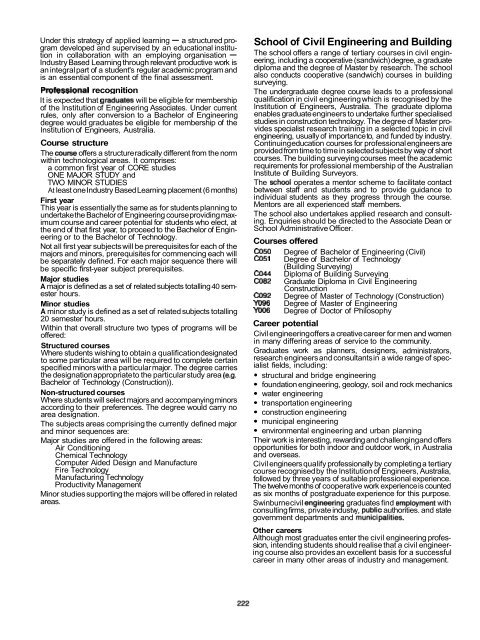1993 Swinburne Higher Education Handbook
1993 Swinburne Higher Education Handbook
1993 Swinburne Higher Education Handbook
You also want an ePaper? Increase the reach of your titles
YUMPU automatically turns print PDFs into web optimized ePapers that Google loves.
Under this strategy of applied learning - a structured program<br />
developed and supervised by an educational institution<br />
in collaboration with an employing organisation -<br />
Industry Based Learning through relevant productive work is<br />
an integral part of a student's regular academic program and<br />
is an essential component of the final assessment.<br />
Pmfessional recognition<br />
It is expected that graduates will be eligible for membership<br />
of the lnstitution of Engineering Associates. Under current<br />
rules, only after conversion to a Bachelor of Engineering<br />
degree would graduates be eligible for membership of the<br />
lnstitution of Engineers, Australia.<br />
Course structure<br />
The course offers a structure radically different from the norm<br />
within technological areas. It comprises:<br />
a common first year of CORE studies<br />
ONE MAJOR STUDY and<br />
TWO MINOR STUDIES<br />
At least one Industry Based Learning placement (6 months)<br />
First year<br />
This year is essentially the same as for students planning to<br />
undertake the Bachelor of Engineering course providing maximum<br />
course and career potential for students who elect, at<br />
the end of that first year, to proceed to the Bachelor of Engineering<br />
or to the Bachelor of Technology.<br />
Not all first year subjects will be prerequisites for each of the<br />
majors and minors, prerequisites for commencing each will<br />
be separately defined. For each major sequence there will<br />
be specific first-year subject prerequisites.<br />
Major studies<br />
A major is defined as a set of related subjects totalling 40 semester<br />
hours.<br />
Minor studies<br />
A minor study is defined as a set of related subjects totalling<br />
20 semester hours.<br />
Within that overall structure two types of programs will be<br />
offered:<br />
Structured courses<br />
Where students wishing to obtain a qualification designated<br />
to some particular area will be required to complete certain<br />
specified minors with a particular major. The degree carries<br />
the designation appropriate to the particular study area (e.g.<br />
Bachelor of Technology (Construction)).<br />
Non-structured courses<br />
Where students will select majors and accompanying minors<br />
according to their preferences. The degree would carry no<br />
area designation.<br />
The subjects areas comprising the currently defined major<br />
and minor sequences are:<br />
Major studies are offered in the following areas:<br />
Air Conditioning<br />
Chemical Technology<br />
Computer Aided Design and Manufacture<br />
Fire Technology<br />
Manufacturing Technology<br />
Productivity Management<br />
Minor studies supporting the majors will be offered in related<br />
areas.<br />
School of Civil Engineering and Building<br />
The school offers a range of tertiary courses in civil engineering,<br />
including a cooperative (sandwich) degree, a graduate<br />
diploma and the degree of Master by research. The school<br />
also conducts cooperative (sandwich) courses in building<br />
surveying.<br />
The undergraduate degree course leads to a professional<br />
qualification in civil engineering which is recognised by the<br />
lnstitution of Engineers, Australia. The graduate diploma<br />
enables graduate engineers to undertake further specialised<br />
studies in construction technology. The degree of Master provides<br />
specialist research training in a selected topic in civil<br />
engineering, usually of importance to, and funded by industry.<br />
Continuing education courses for professional engineers are<br />
provided from time to time in selected subjects by way of short<br />
courses. The building surveying courses meet the academic<br />
requirements for professional membership of the Australian<br />
Institute of Building Surveyors.<br />
The school operates a mentor scheme to facilitate contact<br />
between staff and students and to provide guidance to<br />
individual students as they progress through the course.<br />
Mentors are all experienced staff members.<br />
The school also undertakes applied research and consulting.<br />
Enquiries should be directed to the Associate Dean or<br />
School Administrative Officer.<br />
Courses offered<br />
C050 Degree of Bachelor of Engineering (Civil)<br />
C051 Degree of Bachelor of Technology<br />
(Building Surveying)<br />
C044 Diploma of Building Surveying<br />
C082 Graduate Diploma in Civil Engineering<br />
Construction<br />
C092 Degree of Master of Technology (Construction)<br />
YO96 Degree of Master of Engineering<br />
YO06 Degree of Doctor of Philosophy<br />
Career potential<br />
Civil engineering offers a creative career for men and women<br />
in many differing areas of service to the community.<br />
Graduates work as planners, designers, administrators,<br />
research engineers and consultants in a wide range of specialist<br />
fields, including:<br />
structural and bridge engineering<br />
foundation engineering, geology, soil and rock mechanics<br />
water engineering<br />
transportation engineering<br />
construction engineering<br />
municipal engineering<br />
environmental engineering and urban planning<br />
Their work is interesting, rewarding and challenging and offers<br />
opportunities for both indoor and outdoor work, in Australia<br />
and overseas.<br />
Civil engineers qualify professionally by completing a tertiary<br />
course recognised by the lnstitution of Engineers, Australia,<br />
followed by three years of suitable professional experience.<br />
The twelve months of cooperative work experience is counted<br />
as six months of postgraduate experience for this purpose.<br />
<strong>Swinburne</strong> civil engineering graduates find employment with<br />
consulting firms, private industw, public authorities. and state<br />
government departments and Knicipalities.<br />
Other careers<br />
Although most graduates enter the civil engineering profession,<br />
intending students should realise that a civil engineering<br />
course also provides an excellent basis for a successful<br />
career in many other areas of industry and management.

















